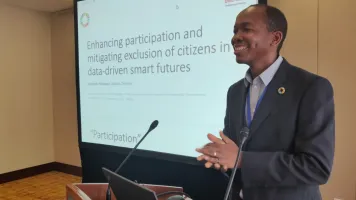The United Nations University Institute in Macau (UNU-Macau) is a research institute at the intersections of information and communication technology (ICT) and international development. UNU-Macau supports the United Nations system and the UN member states by conducting policy-relevant and action-oriented research that addresses the key issues expressed in the UN 2030 Agenda for Sustainable Development.
Our work is framed around the following key thematic areas:
- Data and Sustainable Development: The ensuing data revolution not only holds the potential to support and inform action towards the realization of the UN Sustainable Development Goals, but it also holds great potential to marginalize, exclude and misinform. Our research in this theme investigates technology-supported meaningful participation of individuals and community-level actors in creating actionable knowledge from local data, empowering citizens with data they trust, improving global datasets with local data, and localizing the SDGs.
- Gender Tech: Twenty-one years after the Beijing Declaration & Platform for Action, which established a roadmap for achieving gender equality, much progress has been made. But, regrettably, the targeted goals are yet to be fully realized. Our research explores the gendered dimensions of the digital age in different societies and seeks new impactful ways to use data, theory, and practice to promote gender equality and women’s empowerment, pursuant to SDG5 imperatives. UNU-Macau also leads the Research Group coalition of EQUALS, a Global Partnership for Gender Equality in the Digital Age, to ensure evidence-based approach towards achieving the Partnership goals.
- Migrant Tech: Human migration and displacement have emerged as key global challenges of the century. Experts suggest that labor migration alone accounts for around 65% of international migration. Our research focuses on the use of technology by low skilled and semi-skilled workers. By drawing from findings of a number of case and design studies, it analyzes how migrants can use technology to empower their situated agency and enable them to enhance their conditions.
- Digital Peace: Our research in this theme is exploring, inventing, and informing ways that information and communication technologies can serve as a tool towards supporting peacemaking efforts by enhancing people’s capacity to acquire truthful information; strengthening their resilience to cope with adverse events, such as conflicts; alerting parties of potential adverse events; and discovering means towards reconciliation, community building, and empowerment.
Priorities as a partner of the Global Partnership for Sustainable Development Data
We believe that the data revolution for sustainable development data holds great promise to support the achievement of the Sustainable Development Goals.
We are committed to undertaking scientific research and investigating relevant technology solutions towards ensuring that we Leave No One Behind from the meaningful enjoyment of the developmental benefits of the data revolution.
Pursuant to this goal, our priority research activities are:
- Investigating and exploring ways to mitigate data marginalization and exclusion.
- Employing participatory approaches for indicators development for localizing the SDGs.
- Taking stock of the current state of and identifying gaps in gender-disaggregated data as it relates to digital equality.
- Pursuing case study research on the role of community-based organizations for intermediating and brokering the participation of marginalized and vulnerable population groups.
- Investigating citizen-centric valorization of citizen-generated data and pathways to inform official statistics.
We are committed to leveraging our networks within the UN system and to partner with relevant organizations in pursuit of the sustainable development agenda.


